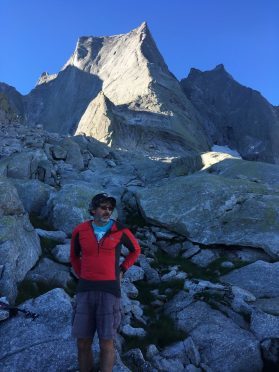Some people seem undaunted by challenges placed in their path. They keep pushing forward, persevering and living life to the full.
North-east man, Duncan Tunstall, was first diagnosed with an inoperable brain tumour back in 2001, but he is celebrating a successful season competing in some of Scotland’s toughest hill races.
He initially suffered from seizures and eye problems, and although the tumour was non-malignant at that stage, doctors warned him it would eventually become cancerous and he would be fortunate to live for another five years.
Yet even the discovery that it could not be removed, due to its location in his brain, did not deter this redoubtable character from throwing himself into every task.
A decade and a half later, the tumour is now classed as grade three, but the 54-year-old former oil trader from Aboyne is still pursuing his twin passions of climbing and hill racing.
During the summer, he scaled one of the six north faces of the Alps and took part in several challenging Scottish races including the Ring of Steall SkyRace and the Pentland Skyline.
Mr Tunstall moved from London to Aboyne with his wife Jacqueline following his diagnosis, and he often goes out from his home to prepare climbing routes to allow others to tackle ascents more easily – a process called “cleaning” a climb.
In addition to this, he helps run a thriving climbing club in the village where he aims to get people of all ages involved in the activity.
He originally took up the pastime after undergoing chemotherapy for the treatment of his tumour and aims to show others that a diagnosis such as he endured need not put an end to running or climbing.
He explained: “If I push myself too hard, my brain sometimes goes into meltdown and I can end up having a seizure, which is not something I want to be encouraging anyone to do.
“But, as long as I am not fussed about where I finish, I can generally finish races safely and enjoyably.
“I really want to help other people like me to get out there and be more active.”
He has worked alongside the Brain Tumour Charity to share his experiences and has spoken at an information day, organised by the charity in Aberdeen.
Understandably, the group’s chief executive, Sarah Lindsell, praised his efforts and attitude to dealing with his illness.
She added: “Duncan’s determination to carry on doing what he loves despite his diagnosis is a real inspiration.
“By sharing his story and encouraging others diagnosed with a brain tumour to think about what might be possible for them – even if it isn’t hill running – he will bring hope to many of those we support.”
Mr Tunstall isn’t pretending he doesn’t have peaks to scale.
But he goes into them all with a positivity which is inspirational.
